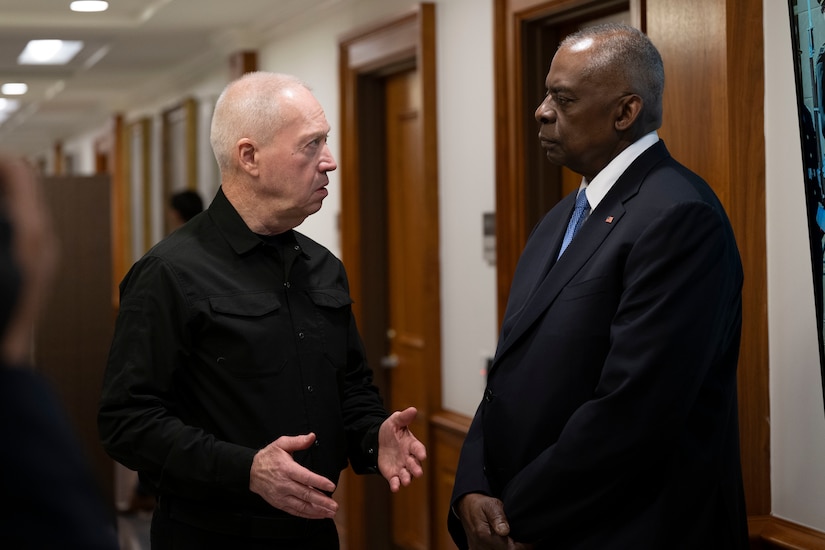Secretary of Defense Lloyd J. Austin III stated today that the U.S. remains committed to supporting Israel’s efforts to defeat the Hamas terror group in Gaza, with the understanding that such efforts must prioritize keeping Palestinian civilians out of harm’s way.
His remarks came at the beginning of a bilateral meeting at the Pentagon this morning with Israeli Defense Minister Yoav Gallant.
“President Biden has been clear: Israel has a right to defend itself like any other state. So, we’re working with Israel to ensure that an outrage like October 7th can never happen again; and the United States will not rest until all the hostages are home,” Austin said at the start of the meeting.
“And as I have consistently said,” he continued, “protecting Palestinian civilians from harm is both a moral necessity and a strategic imperative…. The safety of the 1.5 million Palestinians in Rafah is also a top priority of the United States.”
Regarding Rafah, a significant portion of the meeting focused on Israel’s concept of operations in that city, with Austin expressing that the U.S.’s goal is to help Israel find an alternative to a full-scale military operation that could potentially endanger the city’s civilian population, according to one senior defense official familiar with the meeting.
The secretary made clear during the meeting that such an alternative would involve a “sequence and a phasing of activities” that would be needed to make civilian protection a priority, and that any military operation should not proceed unless a “credible and implementable plan” is already in place to ensure the safety and humanitarian support for civilians sheltering in the area.
When questioned as to how confident he is the U.S. and Israel are going to be able to find a viable alternative to a use-of-force-only approach in Rafah, the official said both sides are confident such an alternative is possible.
“We believe that the concepts that we are sharing and the additional ideas we’re developing based on those concepts have the potential to achieve the dual objectives of protecting the civilians who are currently in Rafah and defeating the Hamas battalions that are in Rafah,” the official said.
On the topic of humanitarian support in Gaza, Austin stressed the important need for “immediate increases and assistance [in aid] to avert famine.”
During the past month, U.S. Central Command has coordinated the delivery of thousands of meals via airdrop into Gaza. Earlier this month, Centcom announced the construction of a temporary pier along the Gaza shoreline to facilitate the delivery of additional aid by sea.
“Our work to open a temporary humanitarian corridor by sea will help,” Austin said this morning, “but the key is still expanding aid deliveries by land.”
In one promising humanitarian aid-related development, the senior official said that the flow of assistance throughout the Gaza region has been on the uptick over the past month, with a roughly 100% increase in aid (200 trucks in March versus 100 trucks in February) getting to civilians.
“We see results,” said the official, “but we also see the need for significantly more results.”
Prior to this morning’s meeting Austin and Gallant met in Tel Aviv in October and December last year, and the secretary noted that they had spoken on the phone more than 40 times since the Oct. 7 terror attacks on Israel.
“I think it was a very good conversation today between the secretary and the minister. They know each other well, they trust each other, [and] they are friends,” said the senior official.
“And so, I would say the sharing of the secretary’s ideas… was met by very receptive ears.”









